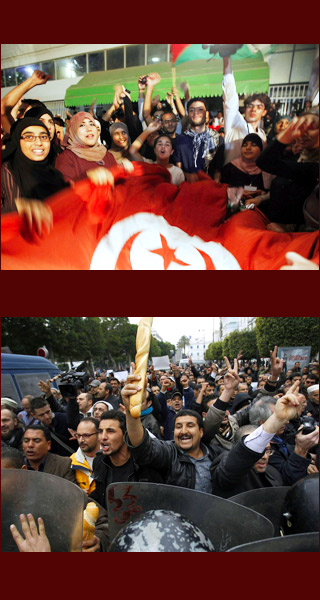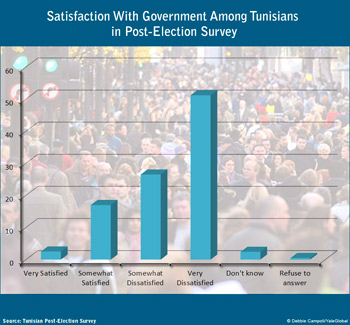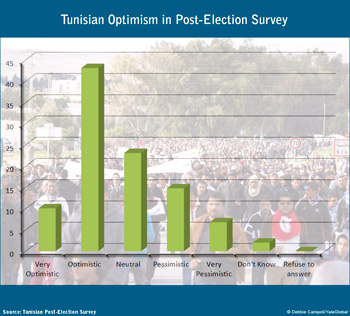Tunisian Revolution Is Work in Progress
Tunisian Revolution Is Work in Progress

TUNIS: The self-immolation of a Tunisian citizen that sparked the North Africa–wide uprising called the Arab Spring may have left a deceptively simple vision of the region. The fact that the overthrow of Muammar Gaddafi or Hosni Mubarak has been followed by new turmoil does not mean Tunisia, too, is ready for a second revolution, as recent media reports, and a Facebook campaign by that name, suggest. A survey conducted in October and November of this year shows Tunisians are dissatisfied with the outcome of the first revolution that ousted Ben Ali, but are not ready for a second revolution.
Discontent is evident in Tunisia, and 24/7 television coverage of Egypt’s turmoil and civil war in Syria tends to portray the region as a cauldron of strife. On 30 November, a demonstration in Siliana, a poor farming town in Northern Tunisia, led to violent clashes with security forces, a five-day standoff, uprisings in neighboring towns and eventually the resignation of a detested governor – another point in escalating tensions between the government and the people.
These tensions remind us of just how difficult transitions are, but also call into question whether Tunisia is poised to descend into disorder: Will Tunisia follow the lead of its neighbors to the East? Is the Islamist party En-Nahda tightening its grip on power? Will violent struggle emerge from the increasing polarization between religious and secular segments?
Certainly the present situation is difficult. In our recent survey of 1200 Tunisians in 16 governorates, we found that 28.4 percent report they’re better off than they were before the revolution, 46.9 percent see themselves as worse off and 25.7 percent see no change. Nearly one third of Tunisians feel their personal situation is worse off than before the revolution, and only 13.9 percent feel it has improved.

Moreover, for many Tunisians, success of the revolution, and achievement of democracy, is measured in terms of bread, not freedom. The majority, over three-quarters, of Tunisians agree with the statement “Democracy may have its problems, but it is the best form of government,” but when asked what democracy is, 32 percent say it means the distribution of basic necessities – food, clothing and shelter – to all citizens, in comparison to just over 25 percent who define it as alternation of leaders through elections and another 27 percent who focus on rights to criticize leaders without fear.
Like their Egyptian and Libyan counterparts, Tunisians are finding that economic problems that prompted regime breakdown are not being solved overnight. Indeed, according to the International Monetary Fund, real GDP declined 1.8 percent in 2011, while unemployment rates rose from 13 percent in January 2011, reaching nearly 19 percent before falling to just under 18 percent today. Gross inequalities remain. Youth continue to be hard hit economically, with nearly 30 percent unemployed; approximately 250,000 graduates a year leave college to find themselves without jobs.
To some extent, the international impact of the violent events in Egypt and Libya contribute to economic stagnation in Tunisia. Tourism revenues are down. The risks of violence outweigh the call of beautiful beaches and desert-scapes. Coupled with worldwide economic recessions that keep tourists closer to home, the results are devastating. In 2011, tourism receipts – which make up 6.5 percent of Tunisia’s GDP and employ approximately 350,000 Tunisians – fell nearly 30 percent, according to the IMF. This began to rebound in 2012, but plummeted after the 14 September attacks on the US embassy and news of other demonstrations by Salafists began to spread.

More than half of Tunisians feel the Constituent Assembly is doing a “poor” job, with almost another third considering it as doing a “fair” job. Similarly, about half of Tunisians are dissatisfied with the government. When asked if they’d vote for the same party again in future elections, less than one third of voters who voted in the 23 October 2011 elections for parties that formed the ruling troika – the coalition of En-Nahda, Ettakatol and CPR – would vote for the party again.
But that doesn’t mean another revolution is forthcoming. Evidence from our survey suggests it’s unlikely, at least in the short-term. Tunisians worry about growing insecurity and express hope that political elites will quit bickering and posturing, connect with the people, and work for the benefit of the country.
Tunisians are discontented, but by and large channel their discontent through political and economic institutions. Certainly, strikes and demonstrations are common. Institutions – political parties, the Constituent Assembly and trade unions – are not as strong as they could be. But, unlike in Egypt where demands and counter-demands are fought as much on the streets as at the ballot box, in Tunisia institutions are the main arena of contestation. Indeed, even the general strike on 13 December was due to the channeling of economic grievances and political contestation through the Tunisian General Labor Union, in existence since 1946.
The stark contrast in Egypt’s and Tunisia’s experiences with legislating, and constitution-making, helps explain why the latter is unlikely to experience an Egyptian-style crisis. Whereas the military administration Supreme Council of the Armed Forces dismissed Egypt’s elected parliament days before presidential elections, the Tunisian Constituent Assembly has remained intact. Rather than expressing dissatisfaction with the constitution-drafting process by walking out – as Egyptian counterparts did from a smaller appointed committee – Tunisians battled over hard issues, including the role of women and how to establish the electoral commission, in the larger assembly.
The long process has increased dissatisfaction among Tunisians, who claim the assembly is slowing the process to delay elections and maintain power. Those who expect crisis in Tunisia also argue that the hardest days, when the constitution will finally go up for a vote, are ahead. Yet, arguably, this slow, inclusive, institutionalized process can help avoid crisis.
Tunisians are frustrated, but not disengaged from the political process. As we have noted in Foreign Policy, more than 70 percent of Tunisians would vote in elections if those were held tomorrow; about 15 percent would boycott them, and another 14 percent are undecided.
There is enormous fluidity in support for parties. While En-Nahda remains the strongest party, only 12 percent say they would support En-Nahda if elections were held tomorrow. More than half of Tunisians, 58.4 percent, do not know which party they would vote for if elections were held tomorrow, which suggests there’s time for new actors and alliances to emerge. Perhaps most importantly, 53 percent of Tunisians describe themselves as optimistic or very optimistic over Tunisia’s future.
Most Tunisians do not support a second revolution. Despite the rhetoric, the vast majority prefers gradual change; less than 10 percent favor rapid change. The parties, too, are seen as fostering evolution, not revolution.
Of course, one could argue that revolutions are not made by majorities. Indeed, our poll finds that only 14 percent of Tunisians and, according to DEDI/ACPSS polls, participated in demonstrations that brought down Ben Ali.
Tunisians’ fight over the future is taking place primarily through formal institutions. The goal should be to shore up processes. Doing so requires emphasis on economic growth and reform as well as on political parties, parliaments, elections and constitutions. But for many Tunisians, democracy means not just institutions, but welfare as well. Focusing on economic growth, as well as political institutions, is key to ensuring that Tunisians support the process and remain engaged, long enough for democracy to take root.